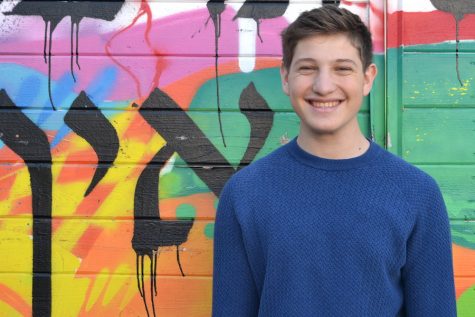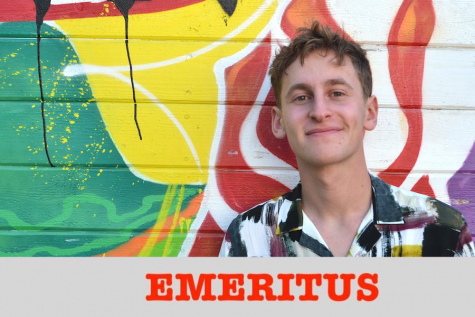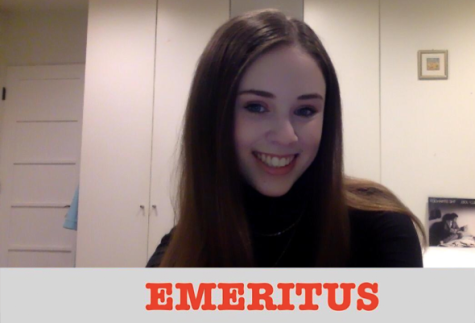Open Fairness hearing Friday morning will consider possible change to Fairness Chair election outcome
‘Quirks’ of three-year-old instant runoff voting system to be considered in light of close election with multiple winners
THOUGHT: Voters considered how to rank candidates in last Tuesday’s Just Community elections in the gym. Races with more than two candidates were tallied according to an “instant runoff” system.
The Fairness Committee will hold an open hearing this morning to decide whether to change the outcome of this week’s election for Fairness Co-chairs, which were thrown into doubt Wednesday after the author of computer code used to compute the results called Agenda officials wondering whether the formula was unfair in elections with two winners.
In a post on Schoology at 9:19 p.m. yesterday, outgoing Fairness Co-Chair Jordana Glouberman announced that a hearing would take place on Friday morning.
“It will be public so all are welcome to come,” Jordana wrote. “It will be held tomorrow during hashkama break in Dr. Harris’ room.”
The code applies an “instant runoff” system to computerized voting when voters may rank more than two choices for an office. It was written by alumni Sam and Zack Hirschhorn when they were 11th-graders in 2017 and has been used every year since then, but this was apparently the first time it changed the winner.
Original results published by Agenda on Schoology Tuesday named juniors Joseph Klores and Evan Rubel next year’s Fairness co-chairs, defeating Gilad Spitzer and Ashley Botnick.
But at 3:41 p.m. yesterday, Talia posted a statement to Schoology saying that the Agenda Committee had asked the Fairness Committee to decide whether to affirm or change the result.
“We realized (with the help of some alum) that in implementing this system, we failed to consider how it would affect a position with more than one winner,” Talia wrote.
“Questions arose about whether we should have treated voters’ first and second place votes with equal weight, or rather run the election as a typical instant runoff. The aforementioned two ways would have produced different outcomes for the race of Fairness Chair.”
She said “measures were taken to mathematically ensure” that the same problem did not apply to other Fairness races or the elections for leadership of Agenda or SAC. Sam Hirschhorn, currently studying at the Orayta yeshiva in Jerusalem, confirmed in a phone call with the Boiling Point that he personally checked the other races.
“The Fairness Chair race is the only race this change would have affected,” Talia wrote. “We as the Agenda Committee sincerely apologize for this oversight.”
The vote count was conducted by Talia, observed by Boiling Point Co-Editor-in-Chief Clara Sandler on Tuesday afternoon in Judaic Studies Principal Rabbi David Block’s office, and the results were announced via Schoology and the Boiling Point at about 5:45 p.m.
The next morning, Sam and Zack Hirschhorn told the Agenda Committee that the system may not have provided the intended result.
“We did [the Instant Runoff system], it worked out well, we got the results,” Talia said in an interview with the Boiling Point yesterday. “The next morning, they alerted us that there was a fundamental issue with applying the instant runoff system to races where there are two winners.”
In text messages to Gilad Spitzer, Sam said that had the votes been put through a different system, Gilad would have won a Fairness Co-Chair spot.
“After the election, we looked at the results and realized it might potentially make more sense if votes were counted as putting someone number one and number two were [tallied as] equal,” wrote Sam. “We looked to see what would happen if we did that and saw that the results changed (you won).”
What followed was a series of Agenda phone calls to the Fairness Chair candidates during which they were told of the uncertainty, along with lengthy meetings among Agenda leaders about how to proceed.
They decided to leave the decision to the Fairness Committee, which will hold a hearing on it Friday morning.
Dean of Students and Agenda adviser Rabbi Ari Schwarzberg told the Boiling Point that while the election results will remain as they stand for now, they might be changed.
“We’re intentionally not saying that we made a decision to uphold it,” Rabbi Schwarzberg said. “The idea is that we’re saying ‘as of now the results stand, but it will be taken to fairness for further review.’ We’re not taking a stand as a committee of saying ‘we’ve made a decision to keep it.’”
The “Instant Runoff” system, first implemented at Shalhevet in 2017, works differently from a simple popular vote. It’s complicated and can be hard to understand — it was explained at Town Hall that year in a video — and in the case of elections with two winners, even moreso.
Voters rank their choices in order of preference instead of voting for only one candidate, and the candidate with a plurality of votes — say, 35 percent among five candidates — might not end up as the winner.
Instead, the computer program sorts the ballots such that the candidate with the fewest first-place votes is eliminated, and those who voted for the eliminated candidate have their votes distributed among those they chose for second place.
The process continues until one candidate has a majority. In the case of the election for Fairness Co-Chairs, the elimination continued until there were two remaining candidates — Evan and Joseph.
In an actual runoff — with a second election to choose winners — people would vote for two choices, without ranking them. In Instant Runoff system used this year, how people ranked their choices was part of how the formula came to its conclusion.
Second-place votes for candidates other than the candidate with the fewest first-place votes did not play a role in this year’s election. Gilad would have been one of the of the winners if they had.
Talia said that is what is now being questioned.
“That in theory sounds great, but in an instant runoff, since you ignore most of the second-place votes, and because in the past when thinking about an election with two winners, we’ve done it so that people have just voted for two winners… there is an argument to be made that it isn’t fair to ignore the vast majority of those second place votes,” Talia said.
“So what ended up happening in the Fairness Election is if you had just counted the first -and second-place votes and added them together and attributed the total to each candidate, there would have been different winners than had we run a regular instant runoff, which we had done in previous years.”
She said that the oversight was not a coding error, but that the system is simply not suitable for electing two winners.
“There isn’t something inherently wrong with the instant runoff — it just needs to be altered in the case of two winners,” she said. “Had we altered it, and there are ways to alter it that could have fitted perfectly that I think would work for next year, but we didn’t consider the alterations.”
In his email to Gilad, Sam Hirschhorn said his formula did not take into account that people who voted were serious about their choices for number 1 and number 2.
“Basically it was just a super-close election and every system has its quirks,” Sam wrote. “It’s unfortunate that you lost and good luck on the rest of your junior year.”
Rabbi Schwarzberg said that the committee would discuss changes to the election process in the future,
The instant runoff system was approved by the entire Agenda Committee in the spring of 2017 on a vote of 5-4. At the time, there were six candidates running for Agenda chair and the system was presented as an alternative to runoff second election.
One of the people who spoke in its favor was Talia Gill, who was then 10th-grade Agenda rep, according to a Boiling Point article at the time.
“‘I don’t think any kids would take a second election,’ said Talia Gill, 10th grade representative to Agenda, who worried that voter turnout for a possible second election would be small.”
Editor’s note: Gilad Spitzer is Web Editor-in-Chief of the Boiling Point.

Lucy Fried was co-editor-in-chief during the 2018-19 school year and went on to study at the Hartman Institute in Jerusalem. She is now a junior at UC Berkeley.

Nicholas Fields has been a member of the Boiling Point since freshman year. Starting off with a story about freshman orientation, he quickly fell in love with journalism. After serving as a staff writer for over a year, Nicholas became the Arts and Culture editor in his second semester as a sophomore and served as Torah editor as a junior. He is currently the Managing Editor of the Boiling Point, helping both the web and print teams. Outside of Boiling Point, Nicholas is a co-founder of the Astronomy Club, and a member of the Etta youth board and Shalhevet Model Congress team.

Jacob Joseph Lefkowitz Brooks was editor-in-chief during the 2019-20 school year and is now a student at the University of Toronto.

Molly is studying at Midreshet Torah v'Avodah seminary in Jerusalem and will attend Columbia University in New York next year.








